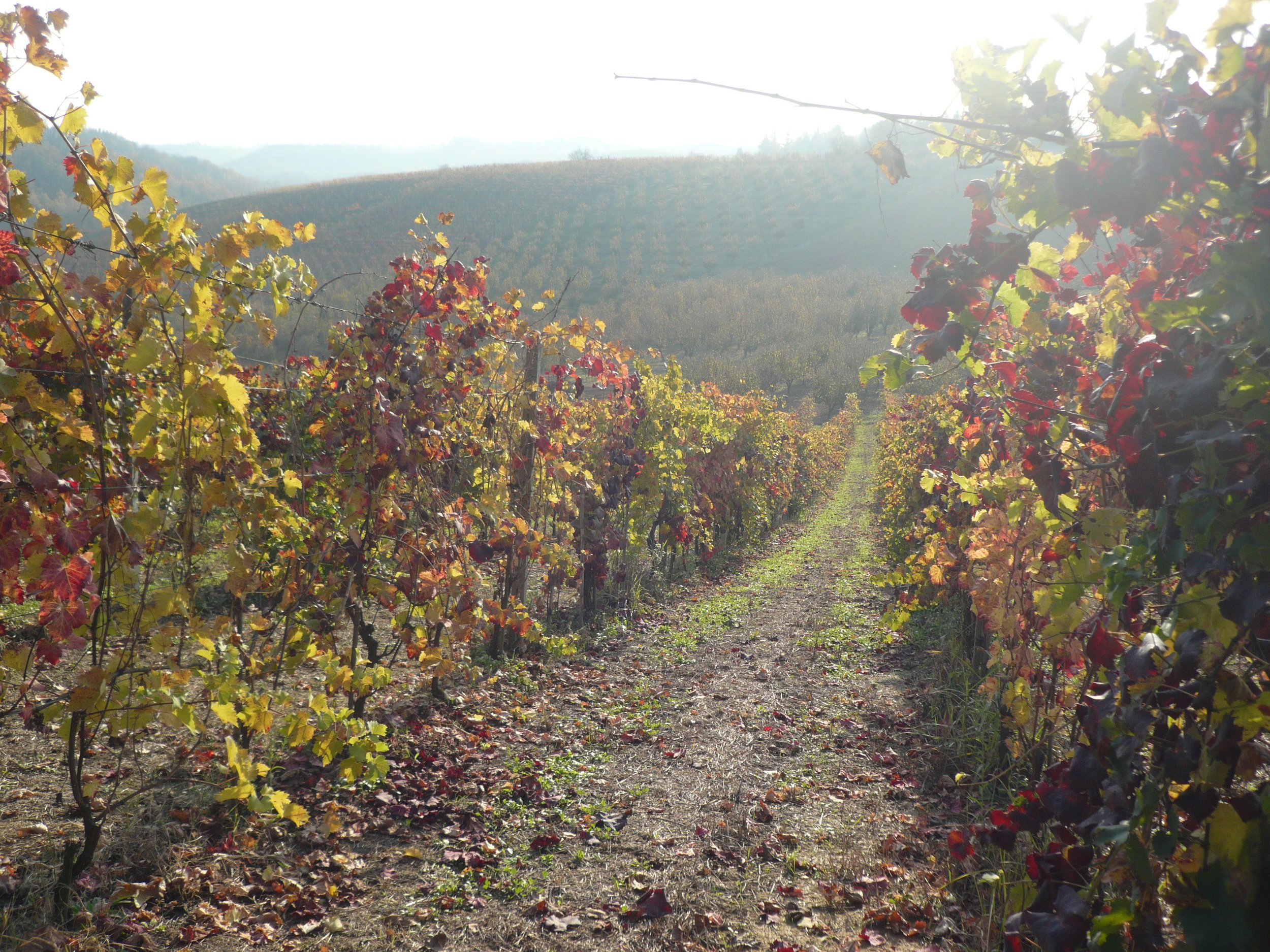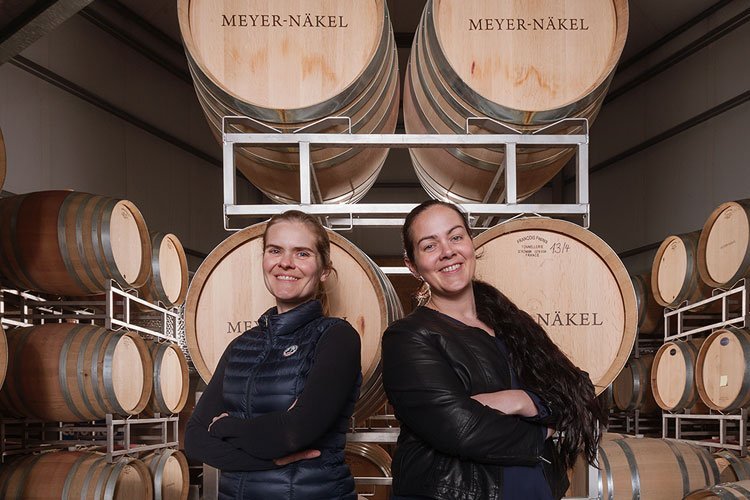
Meyer Näkel
Dernau, Ahr Valley, Germany



Sisters Meike and Dörte Näkel are the 5th generation at this pioneering Ahr Valley winery who, despite unprecedented challenges, are making some of the most compelling Pinot Noir in Germany. The name Meyer Näkel goes back to the marriage of grandparents Paula Meyer and Willibald Näkel who, in 1950, joined their respective pub and winery together to form the estate. At the time, they cultivated an area of just 1.5 hectares, yet were able to make a small name for themselves because Willibald’s production of dry red wines represented thoroughly pioneering work. During the post-War years, and for some decades afterwards, German wine was simply always sweet. This was a time when there were lots of tourists, and the product of the valley was Liebfraumilch-style mass production, with lots of sweet rosé and sweet red wines. 'People used to drink the red wine warm,' says Meike.
Their father, Werner, who worked as a high-school teacher of physical education and math, took over the estate in 1982. He went to Burgundy and brought back barriques, and he went into the vineyards and dropped half the crop. 'He was seen as crazy,' says Meike. 'No one at the time was thinking of quality production.' In 1989 Werner won a prize for his 1987 vintage. Step by step, Meyer Näkel progressed. Together with wife Claudia, Werner gradually expanded the wine estate to its current size, and got involved in numerous other initiatives and projects. Werner worked very early on to ensure that his two daughters, Meike and Dörte, could follow in his footsteps. Both sisters initially completed training as vintners, then went on to study for a degree in wine cultivation in Geisenheim before gradually taking over the operation of the wine estate.
Meike and Dörte maintain the Meyer-Näkel estate’s focus on quality red wine. “As the 5th generation, we live the tradition of winegrowing in our family. During that time, viticulture and cellar management have undergone massive changes. Today we have great technical possibilities for cultivating our steep slopes, but our work in the cellar is still very much handcraft,” Dörte shares. They strive to make the terroir of their steep Ahr slopes tangible in their mineral-laden wines. Grapes are harvested by hand and carefully selected, and the work in the cellar focuses exclusively on gently preserving this high level of quality.
Like many wineries in the Ahr, Meyer-Näkel focuses mainly on Pinot Noir (or as it’s known locally, Spätburgunder). The deep valley of craggy rocks along the Ahr River perfectly positions vines to catch as much sunlight as possible, providing additional warmth and sun exposure in one of Germany’s most northerly winegrowing regions. The unique microclimate is reflected in Meyer-Näkel’s red wines – fruitiness and full body in the foreground, and a slight herbaceousness and minerality on the palate. The estate also produces Frühburgunder, a mutation of Pinot Noir that was considered extinct until the 1970’s but successfully revived. Frühburgunder has many similar properties to Pinot Noir but matures earlier and typically produces softer wines with lower acidity.
The 2021 Flood
In July 2021, Meike & Dörte sustained catastrophic damage caused by the flooding in the Ahr Valley. The torrential downpour and summary floodwaters ravaged not only the winery and tasting room of Meyer-Näkel, but the entire Ahr Valley. The clean-up would have seemed insurmountable if it weren’t for the help and comradery provided to them by nearly every major winemaking team in Germany. Hans & Valentin Rebholz, Katharina Prüm, Klaus Peter Keller, Friedrich Becker, Cornelius Donnhoff, Dorothee Zilliken, and Oliver Haag are just a few of the superstars who aided in the recovery efforts.
Thick brown mud covered everything. Most of the barrels were gone, and the majority of the equipment was ruined. Additionally, they thought that all of the 2018 vintage had been destroyed, until Hans Rebholz opened a side door in the winery, which revealed the entire US allocation of the 2018 Blue Slate Pinot Noir. The bottles were all washed and labeled and we were THRILLED to be able to offer some of the last Meyer Näkel Pinot Noir in the world last year. Now we feel incredibly fortunate that that the sisters have been able to recover from this natural disaster and get production back on track. And the new releases are singing!
Our Selections
Meyer Nakel Pinot Noir Blanc de Noir “Illusion” 2023
A special white wine in Meike and Dörte’s line-up. There isn’t a legal equivalence for “Blanc de Noir” in German wine laws, making this a category on the cutting edge for German wine growers. Very exciting stuff.
The Pinot Noir comes from a mix of weathered slate greywacke soils with southern exposure. The grapes are hand-harvested then gently pressed to avoid saturating the white juice with color. The cooled and controlled fermentation takes place in stainless steel tanks and a small percentage in barriques. The wine is blended and bottled after several weeks resting on the lees.
The relationship to great Pinot Blanc is made plain here: aromas of ripe apple, pear, and peach. Perceptibly creamy on the nose. Develops subtle melon flavors with hints of Meyer lemon. Both vibrant and silky on the palate. 12.0% alc | 4.1 g/l RS | 6.7 g/l Acidity
Meyer Nakel Frühburgunder (Pinot Noir Précoce) 2022
Dorte and Meike think this cuvée could turn into a Grosses Gewächs in time (the Ahr is the only region in Germany that allows for GG Frühburgunder). Their father started planting this early-ripening Pinot mutation in the 1990s and some harvests were minimal – don’t forget, we are talking about farming red grapes at 50 degrees north latitude. Werner started in warmest parts of the vineyard, and since then they’ve propagated more vines via massale selection. Hand harvested with a yield of about 30-35 hl/ha. The wines maturing in used barriques for 10 months. Frühburgunder produces very pretty wine, softer in texture than the estate Pinot with a core of dark wild berries and only subtle oak influence. Juicy and pure. 13.0% Alcohol | 0.0 g/l RS | 6.7 g/l Acidity
Meyer Nakel Pinot Noir Estate 2022
The domain’s stalwart red comes from grapes grown on the classic slate and greywacke decomposed stone. It is fermented in stainless then racked into used, large oak barrels then rested for 12 months before bottling. The core of ripe red berries is balanced by a deep mineral core that is typical of the area. The wine is durable, though lace-like texturally -- Chambolle’s cousin 500 km northeast? Ahr’s true potential is definitely on display here. 13.0% Alcohol | 0.1% g/l RS | 5.5% g/l Acidity.
Meyer Nakel Pinot Noir “Blue Slate” 2022
This dense, concentrated expression comes from fruit grown on blauschiefer (blue slate) soils on Dernauer’s steepest slopes. Berries are destemmed and crushed with maceration lasting for about 20 days. Elevagé occurs in mostly used barriques for 11 month. The stony create a mineral wine with smoky aroma of red fruits, blackberry, blueberry, red currant and dark cherry, accompanied by floral and roasting aromas. Impeccable balance between fruit, mineral, and oak here. 13.0% Alcohol | 0.3% g/l RS | 5.5% g/l RS
Meyer Nakel Pinot Noir Sonnenberg GG 2022
The name Sonnenberg speaks for itself (“sun” + “hill”). At 100-150m above sea level, we find steep slopes that ideally lean south towards, offering supurb conditions for Pinot Noir. Meteorlogical studies have even shown this to be the warmest plot in the whole Ahr! The soil is a skeletal conglomerate greywacke slate mixed with clay over loess and loam. Pinot Noir here shows power and volume, while retaining an elegant minerality and fruit character.
Old vines, sustainable vineyard work, consistent yield reduction and careful hand-picking form the basis for this wine. The yield is around 30 hl/ha. Spontaneous fermentation, then aging in barriques (70% new wood) on the fine lees for 16 months. The wine is bottled unfiltered and rests another six months before release.
Complex bouquet of blackberries, strawberries, Morello cherries and chocolate aromas with a hint of liquorice. Complex, substantial, long finish with fine, harmoniously integrated tannins. 13.0% Alcohol | 0.1 g/l RS | 5.2% g/l Acidity
Meyer Nakel Pinot Noir Pfarrwingert GG 2022
n Dernau, the Ahr valley widens after its bottlenecks and offers space for a steep valley basin in which the Pfarrwingert lies. The name of the vineyard goes back to the Catholic parish church in Dernaus, who is still the landowner here. The particularly favorable southern exposure and slope, in combination with the easily-warming soil results in a special, singluar terroir. The greywacke soils are a granular sediment with clay-slate fragments, forming a sandstone-like structure. The Pfarrwingert site produces extremely fragrant wines with minerality in the front, followed by wonderful fruit and fine spice.
Similar to the Sonnenberg, we find old vines farmed sustainably, with consistent yield reduction and careful hand-harvesting. The yield is around 30 hl/ha. The grapes are carefully transported to the winery in small boxes. Spontaneous fermentation with 20 days of maceration, then aging in barriques (70% new wood) on the fine lees for 18 months. The wine is bottled unfiltered and rests another six months before release.
Wild red berries, blueberries and cherries overlay the wine’s silky, fine-grained tannins. Intense, clear fruit is underlined by spicy herbal components, delicate oak aromas and violets. An animating freshness and saltiness on the palate with taut minerality and supreme depth. 13.0% Alcohol | 0.2 g/l RS | 5.2% g/l Acidity
Meyer Nakel Pinot Noir Rose 2021
100% Spätburgunder (Pinot Noir) from decomposed slate and greywacke stone. The Pinot Noir grapes were gently pressed with a pneumatic press with only minimal time on the skins and fermented slowly in stainless steel tanks under cool temperatures. Unfiltered, the wine was cleared through sedimentation. This is a elegant light pink Rosé with notes of strawberry, peach, honey, melon and red cherries. The palate is refreshing with perfect balance between fruitiness and freshness. 12% Alcohol | 6.1 g/l RS |8.4 g/l Acidity







